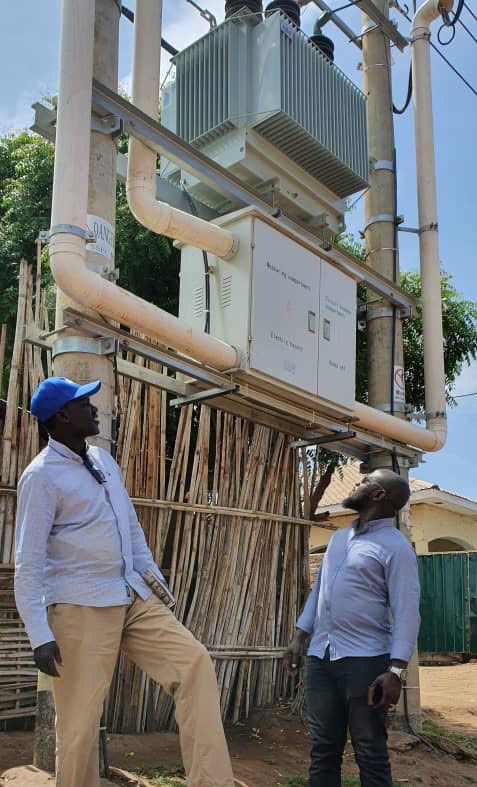Recently, enhancement banks and foreign organizations have started off backing initiatives to revitalize infrastructure and enhance ability generation amid a comparatively tranquil time for the eight-yr-aged region. Most of the new financial investment has targeted in and all over Juba—the nation’s capital and major metropolis, with some 403,000 people.
“There’s a ton of prosperity that is coming with the peace now,” stated Jacob M. Deng, director of organizing and initiatives for South Sudan Energy Corporation, the nation’s sole electric powered utility.
Deng joined the utility in 2010, a yr before South Sudan officially break up from Sudan. In 2013, the nascent African country plunged into a brutal conflict that displaced thousands and thousands of people today and still left approximately four hundred,000 people lifeless. Throughout this time, Deng and his colleagues struggled to keep the electric powered procedure as funding for conductors, insulators, fuses, and engine oil all but disappeared. Gas suppliers hoarded petroleum, forcing the point out-owned ability plants to shut down indefinitely, including Juba’s seventeen-megawatt diesel ability station.
Meanwhile, ants chomped absent at the growing older picket ability poles in city regions. Ideas to grow the nation’s producing potential were quickly shelved. South Sudan had negotiated an agreement with the Norwegian governing administration to construct a 43-megawatt hydroelectric dam, but when the war broke out, Norway redirected its funding toward humanitarian aid.

The work to restore South Sudan’s electric powered sector began in earnest in late 2018, right after South Sudan’s President Salva Kiir reached a peace deal with rebel leader Riek Machar. (Before this yr, Kiir appointed Machar as vice president.)
Last November, South Sudan Energy Corporation began working the 1st portion of Juba’s rehabilitated distribution network. Ability Development Corporation of China strung up new 33-kilovolt strains, replacing the city’s 11-kilovolt strains, a network that will eventually offer twenty,000 additional prospects in the capital metropolis. The Chinese firm is also manufacturing 13,450 prestressed concrete poles from a new facility in Juba. The African Growth Financial institution has accepted a US $14.6 million financial loan for the grid project.
“Our approach is to include every person in the whole metropolis with the [grid] ability,” Deng stated. “I hope that Juba will be liberated from this darkness.”
For now, nonetheless, most of Juba’s people are however utilizing their own ability supplies to run fridges or cost desktops. The utility dismantled the aged grid, and the upgraded procedure is proceeding little by little in phases. Deng stated his own residence most likely will not be related for a number of much more months. The senior engineer alternatively uses a 360-kilowatt rooftop solar array, which he acquired yrs in the past right after the city’s unreliable electric power saved breaking electronics in his household.
The utility is operating to set up or lengthen interconnections with Sudan, Uganda, and Ethiopia to attain into South Sudan’s inside. At the exact same time, the young region is adding its own generation.
Late last yr, Ezra Team opened a 33-megawatt oil-fired ability plant, which will use scrubbers to reduce air pollution. The Eritrean firm states it strategies to construct one hundred total megawatts of fossil gasoline potential in South Sudan by 2021, at a expense of approximately $290 million. Federal government officers stated they approach to repay the financial investment in excess of seventeen yrs by charging increased electric power prices, even though they admitted the strategy faces hurdles. More than 50 percent of South Sudan’s inhabitants life in poverty, and the country’s average tariff of 42 cents per kilowatt-hour is presently prohibitively expensive for numerous homes.
To Deng, diesel-fired generation is not a long-term solution for South Sudan, specified the volatile gasoline market place and diesel’s significant contributions to air pollution and greenhouse gas emissions. He stated the utility is particularly intrigued in building hydroelectric initiatives to offer the nation’s baseload ability, even though adding solar farms and other renewable initiatives to supplement need.
South Sudan’s installed ability potential is about a hundred thirty megawatts, a huge chunk of which is made use of to offer electric power to the country’s ample oil fields. Nevertheless, the country’s ability demand is about 300 megawatts, an volume that’s most likely to grow through peacetime, Deng stated.
“We are truly thirsty [for generation],” he stated. “We will need all these resources of power in our sector.”
South Sudan’s utility just lately concluded complex evaluations for a twenty-megawatt solar farm and 35 megawatt-hour battery storage procedure prepared exterior of Juba. The African Export-Import Financial institution is financing the $forty five million project, which could come on the web as shortly as late 2020, in accordance to El Sewedy Electric, the project’s Egyptian builder.
The utility is searching for buyers to construct a one hundred twenty-megawatt hydropower project in the vicinity of Juba, which could expense $490 million to construct in excess of five yrs. South Sudan’s governing administration states it also strategies to invest in the 1,080-megawatt Grand Fula project proposed in the vicinity of the Ugandan border, even though how and when it would do so is unclear.
Some exterior professionals have expressed issues that—along with creating opportunity environmental injury and displacing residents—large hydro initiatives would be particularly susceptible to disruption or destruction if violence returns to South Sudan.
The governing administration could alternatively partner with private buyers to “lay decentralized grid networks” and offer incentives for “a combine of solar, compact hydro and thermal power” that’s produced by impartial producers, homes, and establishments, the Sudd Institute, an impartial exploration corporation, wrote in a 2018 report. That way, really should the country’s fragile peace unfurl, people today would however have obtain to electric power to meet up with their fundamental requirements.
